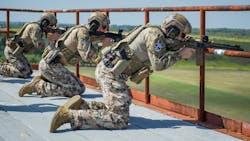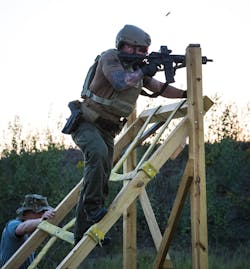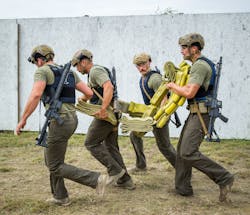Every year the Texas Tactical Police Officer Association (TTPOA) holds a competition centered around tactical ability and agility. The organization has dedicated their time and efforts to cultivating tactics that may be used daily on the job. It is also an ideal way to network and make new bonds with others in the field. The non-profit organization helps SWAT team members put their best foot forward and learn from each experience.
TTPOA is comprised of several individuals with extensive experience. The majority of the organization’s members have a current or former law enforcement background. In addition to the SWAT competition, TTPOA is associated with the annual SWAT conference, and offers trainings all year long. “We typically host one team SWAT competition each year and one SWAT conference as well,” says Sergeant Jon Agnew of the Bryan (TX) Police Department who is also the competition coordinator for TTPOA.
Agnew says the organization promotes officers to visit and network with each other. “This is so that they may have a contact with a different agency where they can share ideas and tactics.” The SWAT Competition also includes a vendor show. “It is an opportunity to bring law enforcement and military units that work in a tactical environment to network and compete,” says Agnew. Both full time peace officers as well as active duty military members are allowed to compete in the event. “We have had out of state teams come and compete as far a Florida.” Over the course of four days, the competition encourages personnel to exhibit their physical strength, precision in shooting, and overall teamwork capabilities. Agnew says each even usually involves five men per team with one alternate chosen. “Each event is timed and scored.” The winning teams earn prizes and trophies. Agnew says the bragging rights for the year are the best reward. However, though the event is a competition, are supportive of each other and cheer each other on. “In the end we are all on the same team when it comes to serving the public,” says Agnew.
In 2016, the McKinney (TX) Police Department won the TTPOA SWAT competition. Carla Peritz, Public Information and Media Specialist for McKinney PD says TTPOA benefits their department in three ways specifically. “It allows us to test our shooting and physical proficiencies against other teams.” It also serves as the leading source for the department’s training opportunities. “We use the organization for classes such as explosive breaching, less lethal, and tactical team leadership.” Finally, the department uses the competition and the training programs to network with other teams. “Collectively we are able to discuss emergency calls that they have seen and how each were handled.” In order to prepare for the event the department conducts specific trainings focusing on firearms and tactics. This training is done over the course of one year. Peritz says three months prior to the competition, the agency chooses five personnel members that will participate. “They begin to train more frequently (from once every two weeks to once a week).”
The McKinney Police Department practices training for it by also participating in obstacle courses, and firearms competition drills, pistol, rifle, and sniper rifle. The agency also focuses their physical fitness in three areas: phosphagenic, oxidative, glycolytic. This way each officer is ready for the competition in every way, shape, and form. “The sniper events have been our strongest events over the past few years.”
Agnew says some agencies choose to train all year round, keeping the competition in mind as they train. Designed specifically to help officers gain more real world experience, TTPOA has carefully coordinated events that simulate situations officers are likely to encounter. Agnew says the competition is beneficial to officers because the event tests each basic skill that a tactical unit would need for their work environment. Some of these scenarios are not often encountered every day. Having the opportunity to practice and train for rare events is a significant benefit. For instance, one event can be a hostage rescue that requires the competitor to shoot a threat target and then rescue an injured dummy. In addition, the competition requires precision and physical fitness for each participant. Another event could be a sniper initiated assault, where a sniper must shoot an obscured suspect target before the assault team raids a shoot house with threat targets in it. Some events require a gas mask and smoke is introduced to limit their field of view and impair their breathing while shooting threat targets on a school bus for example.
By designing each individual event to be as realistic as possible to actual events, SWAT teams are able to simulate and learn imperative tactics that may come into play and help while on the job. “The competition is the closest most officers can get to adding adrenaline, sweat, and stress to simulate the body’s response in a real world crisis,” says Agnew. “The officers leave the event knowing where they stand with their physical fitness, shooting skills, equipment reliability, and team work.”
The event also allows officers to return home to their cities and counties they are able to refer to the lessons they learned through the scenarios presented at the TTPOA competition. “We also promote officers to visit and network with each other so that they may have a contact with a different agency where they can share ideas and tactics,” says Agnew. The competition also allows officers to network and attain ideas and feedback from other agencies. The more knowledge and skill any officer, especially a SWAT team member can acquire, the better it is for every day situations and occasional intensive ones.
As a competition designed for both the mind and body, the TTPOA event allows competitors to utilize and continue to build the ability to perform well and think clearly in the midst of extreme stress. “The main benefits we receive are: team work, critical thinking skills (under stress), higher physical fitness, and problem solving,” says Peritz. Each of these may be implemented on a regular basis while on duty.
The knowledge each team returns home with is an added benefit for all involved in the event. Personnel are able to assess what areas their squad may need to improve upon which will improve work performance. Competitors are also able to utilize new skills learned during training classes that take place at the event as well. TTPOA continues to offer law enforcement agencies high quality training.
This year’s competition be held from September 26 through the 29 in Conroe, Texas. Other upcoming events scheduled as well as additional organization information including training opportunities may be found on their website: ttpoa.training.

Hilary Rodela
Hilary Rodela is currently a Surveillance Officer, a former Private Investigator, a former Crime Scene Investigator, and Evidence Technician. She worked for the Ruidoso (NM) Police Department as well as the Lubbock (TX) Police Department. She has written for several public safety publications and has extensive law enforcement and forensic training and is pursuing forensic expertise in various disciplines. Hilary is a freelance public safety writer and curriculum developer for the National Investigative Training Academy.





